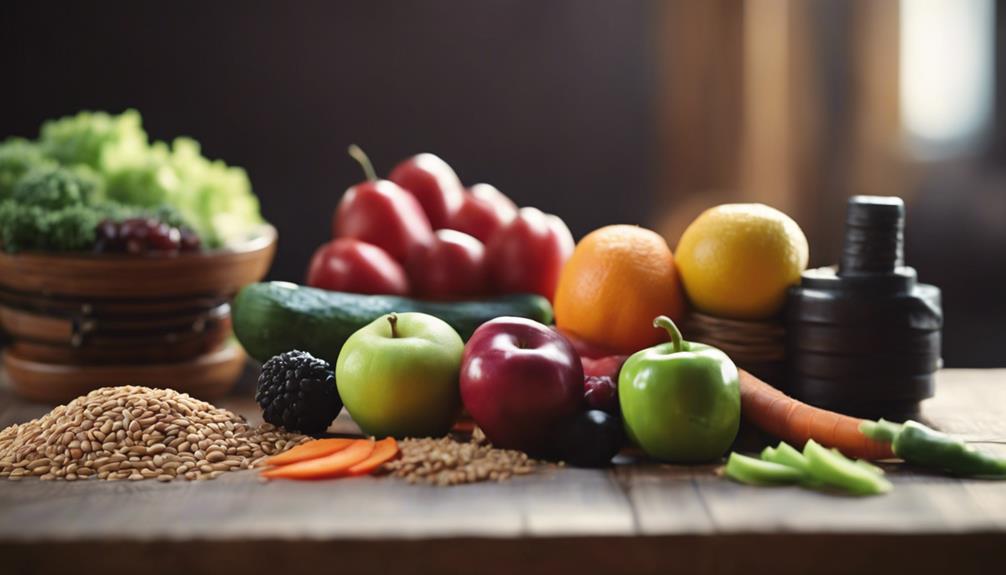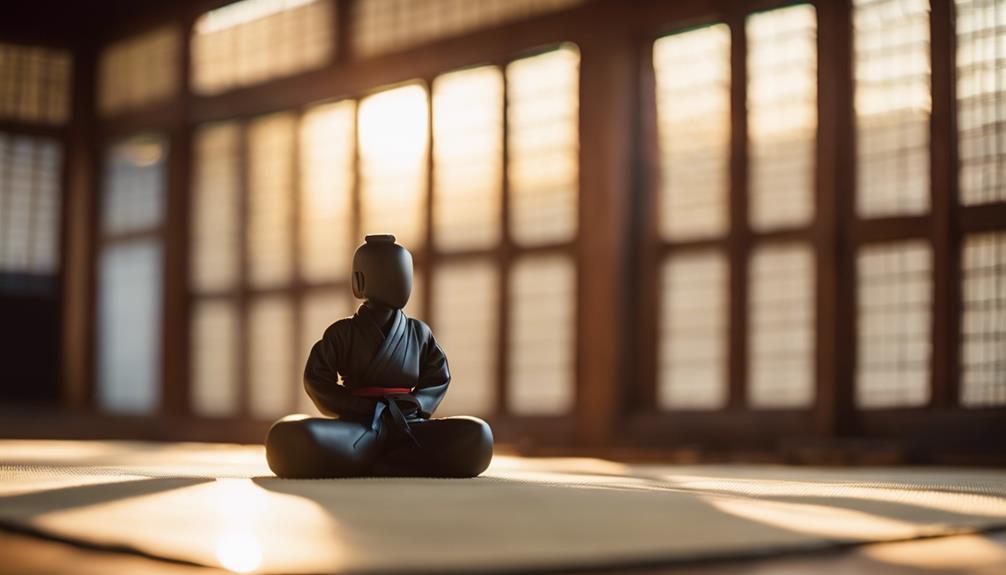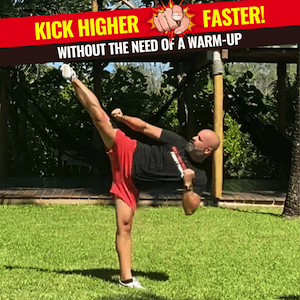As a martial artist over 40, you'll need to adapt your training to thrive. Focus on technique over power, and incorporate low-impact martial arts like Brazilian Jiu-Jitsu or Tai Chi to prevent injuries. Gradually progress your training intensity, and prioritize conditioning and recovery to maintain performance levels. Develop a growth mindset to build resilience, and engage in cross-training to improve overall strength and flexibility. Prioritize nutrition and supplementation, including adequate protein intake and omega-3 fatty acids, to support joint health. By implementing these strategies, you'll be well on your way to a successful and sustainable martial arts journey – and there's more to explore.
Key Points
- Focus on technique over power to prevent injuries and joint damage as you age.
- Incorporate thorough warm-up and cooling down routines to enhance flexibility and aid injury prevention.
- Prioritize conditioning and recovery to enjoy martial arts benefits, acknowledging the reality of increased recovery time with age.
- Engage in low-impact martial arts like Brazilian Jiu-Jitsu or Tai Chi, which are easier on the joints.
- Modify exercises to protect joints while prioritizing technique, and incorporate resistance and core training for muscle preservation.
Overcoming Age-Related Performance Barriers
As you enter your 40s and consider martial arts training, it's natural to worry about age-related performance barriers. However, with a focus on technique over power, many adults in their 40s can successfully begin martial arts training. This approach helps prevent injuries and joint damage, common concerns for older practitioners.
By incorporating thorough warm-up routines and cooling down with focused stretching, you can greatly enhance flexibility and aid recovery. This is essential for maintaining performance levels as you age.
Regular practice of low-impact martial arts, such as Brazilian Jiu-Jitsu or Tai Chi, can provide effective training options that accommodate age-related physical limitations. These styles promote fitness and skill development while minimizing the risk of injury.
By prioritizing overall fitness through physical activity, you can overcome age-related performance barriers and thrive in martial arts training. With a focus on technique, conditioning, and recovery, you can maintain a high level of performance and enjoy the many benefits of martial arts training.
Adapting Training Methods for Success
When fine-tuning your martial arts training after 40, adopting an adaptive mindset is vital to maximizing success and preventing stagnation. Your training methods may need to shift to accommodate the natural changes that come with aging, such as slower recovery times and reduced physical capabilities.
To adapt your training for success, consider the following adjustments:
- Gradual progression: Increase the intensity and complexity of your training gradually to minimize the risk of injury and allow for ideal recovery.
- Technique-focused training: Emphasize technique over power during drills and sparring to reduce stress on joints and minimize the likelihood of injuries.
- Resistance and core training: Incorporate exercises that support muscle preservation, enhance stability, and improve joint support, essential for martial artists over 40.
- Modified self-defense techniques: Assess and modify your training approaches to accommodate any physical limitations or nagging injuries, ensuring your training remains effective and sustainable.
Building Resilience Through Mindset
One key factor sets martial artists over 40 apart from their younger counterparts: the ability to build resilience through mindset. As you age, it's natural to face new challenges that test your physical and mental limits.
However, by developing a growth mindset, you can markedly enhance your resilience. This mindset allows you to view challenges as opportunities for personal growth and skill improvement, rather than threats to your ego.
Research shows that engaging in martial arts training promotes mental resilience, leading to a 25% reduction in stress and improved coping mechanisms in challenging situations.
Regular practice also encourages adaptability, as you learn to respond to unpredictable scenarios, enhancing both physical and mental flexibility.
By embracing the journey of learning and self-discovery in martial arts, you'll cultivate a sense of empowerment and control over your body and mind. This, in turn, positively impacts your overall quality of life.
Your growth mindset and resilience will be put to the test when maneuvering the inevitable injuries that come with martial arts training over 40.
It's crucial to acknowledge that injuries are an unfortunate reality and that recovery time increases with age. You must listen to your body and allow adequate rest between training sessions to prevent exacerbation of injuries.
To minimize the risk of injuries and support recovery, consider the following strategies:
- Incorporate thorough warm-up routines before training to prepare your muscles and joints for physical activity.
- Modify exercises to accommodate nagging injuries and prioritize technique over power during training to protect your joints.
- Engage in regular strength and core conditioning exercises to preserve muscle strength and stability, which directly supports joint health.
- Prioritize structured cool-down stretches after training to aid in injury prevention and enhance recovery.
Nutrition and Supplementation Strategies

As you shift into your 40s and beyond, the fuel you put in your body becomes increasingly essential for best performance in martial arts. Your nutrition and supplementation strategy plays a significant role in supporting your training, recovery, and overall well-being.
Adequate protein intake is key for muscle preservation and recovery, with recommendations suggesting 1.2 to 2.0 grams of protein per kilogram of body weight for active individuals over 40.
Incorporating antioxidant-rich foods, such as berries and leafy greens, into your diet can help combat inflammation and support joint health, which is critical for maintaining mobility in martial arts training.
Omega-3 fatty acids, found in fish like salmon and flaxseeds, are also beneficial for reducing joint stiffness and improving recovery times. Staying hydrated is essential for peak physical performance, so be mindful of your water intake, as the sensation of thirst diminishes with age.
Consider supplementing with vitamin D and calcium to support bone health, particularly if you're over 40. This can help prevent osteoporosis and maintain strength during martial arts practice.
Integrating Cross-Training for Enhanced Performance
Proper nutrition and supplementation lay the foundation for ideal martial arts performance, but to truly take your training to the next level, you'll want to contemplate a cross-training strategy.
Cross-training in activities such as weightlifting, yoga, or swimming can greatly improve overall strength, flexibility, and cardiovascular fitness, enhancing martial arts performance for individuals over 40.
Incorporating cross-training into your regimen can have numerous benefits. Here are a few key advantages:
- *Enhanced flexibility*: Yoga can improve flexibility and balance, reducing the risk of injury and improving performance in martial arts movements.
- *Increased strength*: Resistance training helps maintain muscle mass, which naturally declines with age, and supports joint health essential for martial arts practitioners.
- *Improved cardiovascular fitness*: Low-impact exercises like cycling or swimming can boost endurance without placing excessive strain on aging joints.
- *Active recovery*: Cross-training can engage different muscle groups, allowing for better overall fitness while reducing the risk of overuse injuries associated with repetitive martial arts training.
Maintaining Motivation and Consistency

Maintaining motivation and consistency is essential for martial artists over 40, particularly when faced with the physical and mental demands of training. To achieve this, you can set specific, achievable goals that enhance your motivation. Studies show that individuals who set clear objectives are 42% more likely to achieve them.
Regular reflection about your progress and personal growth can also reinforce your commitment. Tracking your development can help you stay dedicated to your practice.
Incorporating variety in your training routines can also prevent monotony and keep your motivation high. Exploring different martial arts styles or techniques can increase your enjoyment by 30%.
Additionally, finding a supportive community or training partner can greatly boost your motivation, leading to a 25% increase in retention rates among adult practitioners. Celebrating small victories and milestones in your training can also foster a positive mindset, resulting in a 20% increase in self-reported satisfaction and consistency in your martial arts practice.
In Summary
By incorporating these 7 strategies into your martial arts training, you'll overcome age-related performance barriers and continue to thrive. Adapting your training methods, building resilience through mindset, and prioritizing nutrition and recovery will be key to success. Integrating cross-training and maintaining motivation will further enhance your performance. By being proactive and adaptable, you'll defy age expectations and reach new heights in your martial arts journey.



